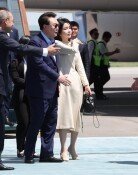[Opinion] The Statue of Former President Park Jung-hee
[Opinion] The Statue of Former President Park Jung-hee
Posted August. 30, 2004 22:05,
Even though the event of May 16 was a military coup, and former President Park Jung-hee was involved in pro-Japanese activities, opinion is divided on any assessment of him. This was the explanation given by the Seoul District Court two years ago when it sentenced those who were prosecuted for demolishing former President Parks statue to one and a half years in prison with a three-year suspended sentence. The judgment was delivered that the destruction of the statue, which was done without the mutual agreement of the nation and due process of law, was unlawful because it disobeyed the basic order of democracy and the principle of observing due process. Those who demolished the statue were declared guilty in early 2003 by the Supreme Court.
The Korea Democracy Foundation (KDF), which one of them worked for, has a regulation that any employees who are sentenced to penal servitude are to be fired. It was said that the KDF amended the regulation in early 2004, even though it had fired the employee, following the indication of the Board of Audit and Inspection (BAI) beforehand. It made a new, exceptional provision that those who are not qualified for employment can be employed when their disqualifications are acknowledged to come from their involvement in the movement for democratization. Therefore, the employee who was fired could be reinstated into service. The KDF explained that his involvement in the movement for democratization dated back to the 1980s, and his activity in demolishing the statue was acknowledged as democratization activity.
There are a variety of opinions on the assessment of former President Park, but there may be no one who advocates his dictatorship. Struggling against his dictatorship was obviously a struggle for democratization. However, the final decision of the Supreme Court was that the destruction of former President Parks statue was unlawful. In addition, it said that the mindset of those who demolished the statue--that their conduct was not a crime--lacked sufficient reasoning. Lets regard the destruction of the statue as a moment in the struggle for democratization, as the KDF argues. However, it was unreasonable to reinstate the employee by making a new provision that makes an exception for those involved in the democratization movement.
The KDF was founded to commemorate democratization activities such as the April 19 revolution and the June 10 civil movement, and uphold their spirit. However, it is not reasonable to regard any conduct related to KDF as democratization activity by ignoring the decision of the Supreme Court. Can it not be regarded as insolent and self-righteous that they can ignore the law when they believe in their arguments?
Kim Soon-deok, Editorial Writer, yuri@donga.com







